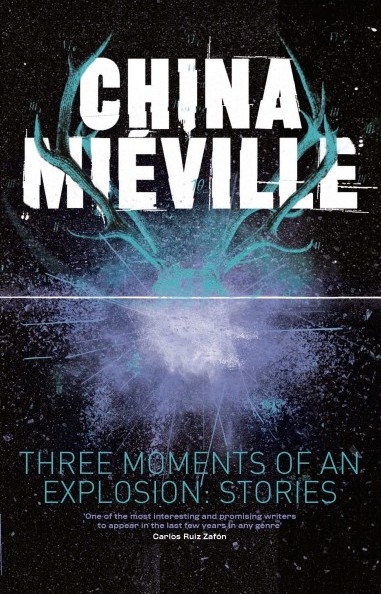Okay, so short stories.
Part of me loves short stories. The precision, the concision, the economy of language within them – read The Dead by James Joyce. Part of me, however, longs for the lengthy, relaxed familiarity you get with the characters in a novel, even in the best of the genre.
In the worst collections of short stories, you get the impression that the author has swept up the offcuts and cast-off fragments from his editing desk and served them up.
So reading any short story collection is a double-edged sword for me.
But Miéville has such a range to his writings and such a wealth of imagination and control over his voices and depth to his settings that I was looking at this with a lot of excitement. And in main part, this collection was wonderful and rich. Not every story in the collection chimed with me – but then you’d expect that from a short story collection. We also have more than just short stories here: the collection includes monologues, meditations and screenplays for film trailers as well as short stories. And within the collection, Miéville takes us into his familiar weird fiction milieus: familiar and recognisable locations confronted by the bizarre and inexplicable such as walking oil rigs, floating icebergs and a sickness which surrounds the infected with a moat. In addition to this, we encounter magic realism, horror, zombie apocalypses and science fiction.
Let’s have a quick canter of some of the most successful stories (at least for me).
- Sӓcken was Miéville’s foray into horror and begins in familiar enough territory: a pair of innocent girls stay in an isolated lakeside cottage in the forests of Germany. Something horrific drags itself from the lake and into the girls’ lives. In itself, the scenario is traditional enough but Miéville’s control over the horror and his navigation of the territories of scepticism, doubt, nightmare and horror was wonderful. As were his descriptions of the
“nightmare calf born without limbs or head or eyes but full of tumors”.
- After The Festival was wonderfully viscerally creepy. Imagining a world in which revellers attend celebrations of slaughter and cooking, and afterwards decked themselves with the severed heads of the slaughtered animals was wonderful. Imagine now the worms burrowing from those heads into the flesh of the people beneath, revealing the animal within the human condition, and the craving those people have for those heads.
- The 9th Technique was, perhaps, the most truly Miévillian in the collection. The description of the diner in which clandestine magical black market transactions was brilliantly evoked and made the purchase of the potent puissance-laden cocoon credible. I wonder how many Miéville-readers wondered whether the cocoon contained a slake moth! Again, the beauty is in Miéville’s descriptions as much as anything: the glass jar in which his protagonist, Koning, placed the cocoon
“did not break and it did not bow or bend or inflate grotesquely as if heated and made soft, but it was harder and harder to lift, denser and denser with shadow.”
- The Dowager of Bees, in my mind, was the most evocative story and showed the greatest control to maintain its conciseness. A gambler discovers that there are impossible and unknown hidden suits of cards capable of manifesting inside any pack of cards in any game, warping reality around them, inserting additional chapters of rules into rule books whenever they appear. The imagery of the cards themselves – with echoes of tarot cards and magic in themselves – and the idea that these cards were somehow conscious or sentient.
I did miss with these stories what has, for me, been the cornerstone of Miéville’s writings: the urban, thriving, decaying, living cities, whether they be London from The Kraken, New Crobuzon from Perdido Street Station or Armada from The Scar. Obviously, that is inherent within the brevity of the genre and at times there are suggestions of it. Dan’s flight in Estate in which he “fingered walls and bollards. He passed a knocked-over bin and knelt to examine it”, where he seemed to be reading the cityscape the way a tracker might read a forest, came close. And then the London of Polynia seemed curiously blank in contrast.
All in all, this collection offers a number of rich and lush gems, all the more evocative for being so concise, and a myriad of interesting ideas and conceits.



I’ve never read anything from Mieville, but I think a short story collection would be a good introduction. It sounds as though it’s got some elements from his longer books…
LikeLike
Yeah there are definitely elements of his writing style there. But he writes fantasy (the New Crobuzon trilogy), political crime (The City and The City) and just great thoughtful literary romps (Railsea).
LikeLike